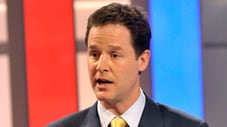
Billed as a small moment of election history, the first televised leaders' debate in British parliamentary history was both more interesting than cynics had predicted and more exasperating than they feared.
The winner, in terms of substance, impact, and the potential for changing an election that remains intriguingly unpredictable, was Nick Clegg. The leader of the Liberal Democrats, Britain's third party, played his "Plague on Both Your Houses" card effectively.
And it was striking that both David Cameron and Gordon Brown were keen to stress how often they agreed or at least sympathized with Clegg's views. If neither main party wins a majority, the Liberal Democrat leader could be kingmaker.
Cameron missed repeated opportunities to challenge Brown’s apparent belief that not increasing taxes “takes money out of the economy” and jeopardizes economic revival. This was as baffling as it was careless.
A snap poll conducted by broadcasters ITV suggested that Clegg (43 percent) was the victor with Cameron (26 percent) in second place and Brown (20 percent) bringing up the rear.
That may, however, have been based upon the first half of the contest, in which the opposition parties tag-teamed Brown effectively, pointing out that his party had enjoyed 13 years in which to address the problems that the prime minister conceded still needed to be addressed.
• More Daily Beast contributors on the U.K. debate• Watch: 6 U.K. debate highlightsAs the debate wore on, though, it was Cameron who seemed to be the most nervous; he was caught in a pincer movement and pushed onto the defensive.
In a debate that focused on domestic issues, all three leaders seemed determined to out-populist the others on matters such as immigration and crime. As the contest ground on, Cameron missed repeated opportunities to challenge Brown's apparent belief that not increasing taxes "takes money out of the economy" and jeopardizes economic revival. This was as baffling as it was careless.
In the great Expectations Game, Cameron had most to lose and Clegg the most to gain, with Brown somewhere in between. And for once the Expectations Game analysis actually matched the reality of the debate.
For those of us used to the rough and tumble and entertainment of the House of Commons, however, this was thin gruel. There were no good jokes, no passable zingers, and little, one suspects, to change the minds of floating voters.
In a shocking development, representatives from each party thought their man won.
Alex Massie is a former Washington correspondent for The Scotsman and The Daily Telegraph. He writes for The Spectator and blogs at www.spectator.co.uk/alexmassie.






